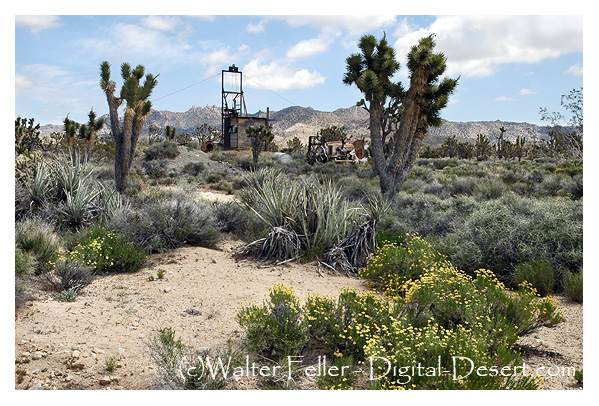--
Death Valley Mine

Gold Milling and Mining Company (initially called Dawson Camp) was formed by the Dawson brothers. First
opened in 1906, most production was between 1917 and 1921. The quartz veins contained argentite (silver sulfide)
and
galena (lead sulfide). Typical of ore bodies in arid climates, the silver at the ground surface was dissolved and
carried down the dip of the vein and redeposited. The portion of the vein above the water table was “secondarily
enriched” with embolite (silver chloride/bromide). The underground workings burned in 1927. The equipment
present today is the result of mine reactivitation in the 1950s, and includes an unusual steel headframe.
The first ore was hauled to the rail head at
Cima,
bound for the mill at
Needles. By 1907, ore was sent to the
American Smelting and mining Company in Salt Lake City. The onsite mill burned in 1927. The 1931 concentration
plant consisted of a Blake-type (14 x 21”) crusher, and classified ore went to an elevator feeding a marathon
rod (roller) mill, then to elevated 10-mesh screens where oversize ore was returned to the crusher. The fines went
to a cone classifier that fed the coarse fraction to an Isabell concentrator, and fines to a double-deck Deister (concentrating)
table. The entire plant was driven by an electric
motor.
When one author (Bob Reynolds) visited the mine caretakers (Dick and Bea Huff) in the mid-1970s, Dick had
just finished clearing debris from the collapsed vertical shaft. He and Bob climbed down to the main crosscut and
observed almost a hundred skeletons of birds
(scrub jays
and
flycatchers) and mammals
(cottontails and
ground squirrels). During
hot weather, the animals had worked their way down fissures in the collapsed shaft, following
the scent of moisture. Groups of skeletons lay pointed at puddles; they could enter the mine to drink sulfate-rich
water, but could not climb out for food.
Old Ores:
Robert E. Reynolds and Ted Weasma
-
Inspired by Death Valley Scotty, Mr. Dawson claimed to have discovered an amazingly lucrative mine near Furnace Creek in Death Valley in 1905. In a nationwide campaign, Mr. Dawson urged Americans to buy shares in his mine, promising them a share of the immense profits. There was just one problem: The mine didn’t exist.
In 1906, Dawson did buy a mine, perhaps to protect his reputation in case anyone started investigating his company. The mine he bought wasn’t located in Furnace Creek, though – it was 150 miles south. Just to clarify: to cover his tracks about his fake mine in Death Valley, B.X. Dawson bought a real mine, near Kelso…and named it the Death Valley Mine.
The Death Valley Mine got decent returns in its first couple years of operation, so B.X. Dawson (and his brother) decided to get out when they were ahead. They skipped town with about $250,000 in 1907.
The Death Valley Mine remained productive until 1931. The main manager’s residence (constructed in 1910) and several other buildings still stand at the site today.
(NPS)

Photos: The beautiful two-story residence at Death Valley Mine, which features a row of perfectly transplanted Joshua trees as landscaping in the front.
History of the Death Valley Mine
The Death Valley Mine was discovered in 1906 by J. L. Bright of Kelso. In July, 1906, the Death Valley Gold Milling
and Mining Company of Denver took over the mine, and ... (more)
 -
- 
 -
- 
 -
- 
 -
- 